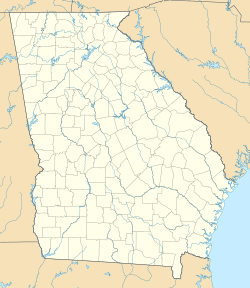Pine Bloom Plantation facts for kids
Quick facts for kids |
|
|
Pine Bloom Plantation
|
|
| Nearest city | Newton, Georgia |
|---|---|
| Area | 2,000 acres (8.1 km2) |
| Built | 1850 |
| Architectural style | Greek Revival |
| NRHP reference No. | 90000105 |
| Added to NRHP | February 9, 1990 |
The Pine Bloom Plantation, also known as Pinebloom Plantation, is a special historic place located in Newton, Georgia. It was officially added to the National Register of Historic Places on February 9, 1990. This means it's recognized as an important site that should be preserved for the future. You can find it on Tarva Road and County Route 122, about three-quarters of a mile south of the Baker County, Georgia/ Dougherty County line in Georgia.
Contents
A Look at Pine Bloom Plantation
Pine Bloom Plantation is known for its beautiful Greek Revival architecture. This style of building was popular in the mid-1800s and often features grand columns and symmetrical designs, similar to ancient Greek temples. The main house at Pine Bloom was built around 1850.
The Main House
The main house is a one-story building made of wood. It has a unique U-shape and shows off many details of the Greek Revival style. A large front portico (a porch with columns) adds to its impressive look, and it has a hipped roof (a roof that slopes down on all four sides).
What Else is on the Property?
When the plantation was added to the National Register, it included two buildings that were considered "contributing." This means they were important to the history and style of the site. There were also 16 other buildings and structures, like a modern skeet range, which were not part of the original historic design.
Connections to History
The Pine Bloom Plantation has a connection to Governor Alfred Holt Colquitt. He was an important political figure in Georgia during the 1800s, serving as both a governor and a senator. The site's history is linked to his time.
Recent Ownership
In 1981, the plantation was bought by John M. Harbert, a very successful businessman from Birmingham, Alabama. Today, members of the Harbert family still own the property, continuing its long history.
 | Calvin Brent |
 | Walter T. Bailey |
 | Martha Cassell Thompson |
 | Alberta Jeannette Cassell |



